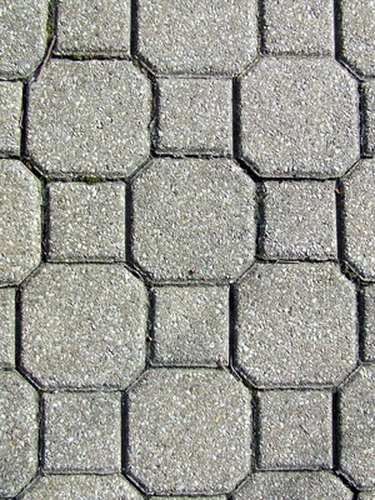
An interlocking paver is a type of concrete, stone or brick that fits together like a puzzle piece. Because of this, pavers may be placed in the ground without mortar. Many types of pavers are available at home and garden stores. The type of paver you use will affect the overall cost and building process of your project.
Brick Pavers
Video of the Day
Brick pavers are frequently made from baked clay. They may be constructed of building brick or simply cast to look like building brick. The pavers are rectangular and may be arranged end-to-end or in patterns such as the herringbone shape. Brick pavers can withstand a lot of pressure, so they are an ideal paver for high-traffic areas such as driveways and walkways. Brick pavers also are less prone to cracking than concrete because the smaller pavers can shift as the earth moves. Because of the expense and labor involved in manufacturing a brick paver, the cost is slightly more than concrete but less than stone.
Video of the Day
Concrete Pavers
Concrete pavers are cast from poured concrete into molds. These may be shaped in intricate, bent shapes for a tight-fitting interlocking pattern. Once a surface made of concrete pavers has been arranged, the surface resembles a cobblestone street. Concrete pavers may be cast in a wide range of colors to allow for flexibility in designing a patio, walkway or other project. Concrete pavers are easy to install, so homeowners can save money by installing them themselves. Concrete pavers are also easy to repair. A cracked paver can be pulled out of the project and replaced with another paver of the exact shape and size. Concrete pavers cost less than either brick or natural stone pavers because the cost of raw materials to manufacture them is less expensive than brick or stone.
Stone Pavers
Natural stone pavers are taken from the earth and carved into manageable sizes. The pavers have a more natural look than concrete or brick pavers and come in a wide range of colors, shapes and sizes. Additionally, the color of the material will not fade with time the way dyed concrete pavers will. Stone pavers may be carved from stone that ranges from marble to granite. Stone pavers are not strong enough for heavy traffic from driveways and instead are more suitable for light foot traffic of pathways and patio flooring. Because of the labor involved in digging the stone from the earth, and individually cutting and shaping each stone, natural stone pavers are the most expensive option on the market.